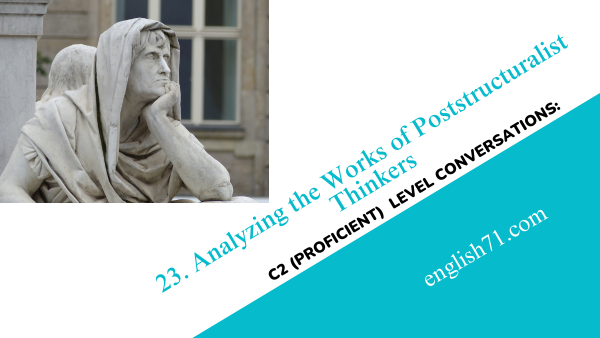C2 (Proficient) level Conversations: (23)Analyzing the Works of Poststructuralist Thinkers

Rafsan: Ahia, have you had a chance to delve into the works of poststructuralist thinkers lately?
Ahia: Yes, I’ve been exploring the ideas of Derrida and Foucault. Their perspectives on language and power dynamics are quite intriguing. What about you?
Rafsan: I’ve been particularly drawn to the deconstructionist approach of Derrida. It’s fascinating how he challenges traditional notions of meaning and truth.
Ahia: Absolutely. His concept of “différance” really resonates with me. The idea that meaning is deferred and constantly shifting challenges our understanding of language and reality.
Rafsan: Indeed. And Foucault’s examination of power structures and how they shape discourse is equally thought-provoking. His concept of the “panopticon” has profound implications for understanding surveillance and control in modern society.
Ahia: Absolutely. Foucault’s critique of disciplinary mechanisms and his exploration of how knowledge is produced within power relations are incredibly relevant today.
Rafsan: Have you come across any other poststructuralist thinkers who have caught your attention?
Ahia: Yes, I’ve been intrigued by Judith Butler’s work on gender performativity. Her ideas about the social construction of identity and the performative nature of gender challenge traditional notions of essentialism.
Rafsan: Ah, Butler’s work is groundbreaking indeed. It’s remarkable how poststructuralist thinkers have revolutionized our understanding of language, power, and identity.
Ahia: Absolutely. Their insights have profound implications for various fields, from philosophy and literature to politics and sociology.
Rafsan: It’s fascinating to see how their ideas continue to shape contemporary discourse and influence critical thought across disciplines.
Ahia: Definitely. Exploring the works of poststructuralist thinkers has been a rewarding intellectual journey, offering new perspectives and challenging entrenched beliefs.
Rafsan: Absolutely. It’s an ongoing process of analysis and interpretation that continually expands our understanding of the complexities of language, power, and society.
Ahia: Couldn’t agree more. The depth and richness of their ideas make them essential reading for anyone interested in grappling with the complexities of the modern world.
Rafsan: Indeed. It’s been a pleasure discussing these ideas with you, Ahia. It’s always enlightening to engage in thoughtful conversations about such profound philosophical concepts.
Ahia: Likewise, Rafsan. I’m glad we could delve into these topics together. It’s conversations like these that truly enrich our understanding of the world around us.
Rafsan: Absolutely. Here’s to continued exploration and intellectual growth through the works of poststructuralist thinkers!
Ahia: Cheers to that!



Summary:
Rafsan and Ahia delve into a comprehensive analysis of the works of poststructuralist thinkers. They explore the foundational concepts and key ideas put forth by prominent figures such as Jacques Derrida, Michel Foucault, and Judith Butler. The conversation delves into topics such as deconstruction, power dynamics, and the fluidity of language and meaning. Rafsan and Ahia critically examine the implications of poststructuralist theories on various fields, including literature, philosophy, and sociology. Their discussion reflects a deep understanding of the complexities inherent in poststructuralist thought and its impact on contemporary discourse. Overall, their conversation demonstrates a proficient level of engagement with complex philosophical concepts.


Everyone loves it when individuals get together and share thoughts.
Great website, keep it up!
Thank you for your kind words! We’re glad you enjoyed the conversation. We’re committed to providing valuable and thought-provoking discussions on various topics. Your encouragement means a lot to us, and we’ll do our best to keep delivering engaging content. We appreciate your support!